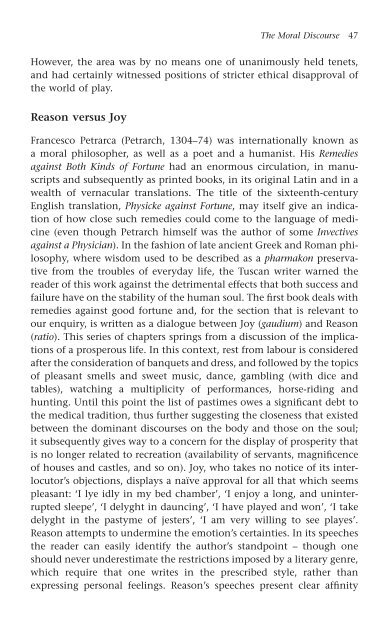Recreation in the Renaissance
Recreation in the Renaissance
Recreation in the Renaissance
- No tags were found...
Create successful ePaper yourself
Turn your PDF publications into a flip-book with our unique Google optimized e-Paper software.
The Moral Discourse 47<br />
However, <strong>the</strong> area was by no means one of unanimously held tenets,<br />
and had certa<strong>in</strong>ly witnessed positions of stricter ethical disapproval of<br />
<strong>the</strong> world of play.<br />
Reason versus Joy<br />
Francesco Petrarca (Petrarch, 1304–74) was <strong>in</strong>ternationally known as<br />
a moral philosopher, as well as a poet and a humanist. His Remedies<br />
aga<strong>in</strong>st Both K<strong>in</strong>ds of Fortune had an enormous circulation, <strong>in</strong> manuscripts<br />
and subsequently as pr<strong>in</strong>ted books, <strong>in</strong> its orig<strong>in</strong>al Lat<strong>in</strong> and <strong>in</strong> a<br />
wealth of vernacular translations. The title of <strong>the</strong> sixteenth-century<br />
English translation, Physicke aga<strong>in</strong>st Fortune, may itself give an <strong>in</strong>dication<br />
of how close such remedies could come to <strong>the</strong> language of medic<strong>in</strong>e<br />
(even though Petrarch himself was <strong>the</strong> author of some Invectives<br />
aga<strong>in</strong>st a Physician). In <strong>the</strong> fashion of late ancient Greek and Roman philosophy,<br />
where wisdom used to be described as a pharmakon preservative<br />
from <strong>the</strong> troubles of everyday life, <strong>the</strong> Tuscan writer warned <strong>the</strong><br />
reader of this work aga<strong>in</strong>st <strong>the</strong> detrimental effects that both success and<br />
failure have on <strong>the</strong> stability of <strong>the</strong> human soul. The first book deals with<br />
remedies aga<strong>in</strong>st good fortune and, for <strong>the</strong> section that is relevant to<br />
our enquiry, is written as a dialogue between Joy (gaudium) and Reason<br />
(ratio). This series of chapters spr<strong>in</strong>gs from a discussion of <strong>the</strong> implications<br />
of a prosperous life. In this context, rest from labour is considered<br />
after <strong>the</strong> consideration of banquets and dress, and followed by <strong>the</strong> topics<br />
of pleasant smells and sweet music, dance, gambl<strong>in</strong>g (with dice and<br />
tables), watch<strong>in</strong>g a multiplicity of performances, horse-rid<strong>in</strong>g and<br />
hunt<strong>in</strong>g. Until this po<strong>in</strong>t <strong>the</strong> list of pastimes owes a significant debt to<br />
<strong>the</strong> medical tradition, thus fur<strong>the</strong>r suggest<strong>in</strong>g <strong>the</strong> closeness that existed<br />
between <strong>the</strong> dom<strong>in</strong>ant discourses on <strong>the</strong> body and those on <strong>the</strong> soul;<br />
it subsequently gives way to a concern for <strong>the</strong> display of prosperity that<br />
is no longer related to recreation (availability of servants, magnificence<br />
of houses and castles, and so on). Joy, who takes no notice of its <strong>in</strong>terlocutor’s<br />
objections, displays a naïve approval for all that which seems<br />
pleasant: ‘I lye idly <strong>in</strong> my bed chamber’, ‘I enjoy a long, and un<strong>in</strong>terrupted<br />
sleepe’, ‘I delyght <strong>in</strong> daunc<strong>in</strong>g’, ‘I have played and won’, ‘I take<br />
delyght <strong>in</strong> <strong>the</strong> pastyme of jesters’, ‘I am very will<strong>in</strong>g to see playes’.<br />
Reason attempts to underm<strong>in</strong>e <strong>the</strong> emotion’s certa<strong>in</strong>ties. In its speeches<br />
<strong>the</strong> reader can easily identify <strong>the</strong> author’s standpo<strong>in</strong>t – though one<br />
should never underestimate <strong>the</strong> restrictions imposed by a literary genre,<br />
which require that one writes <strong>in</strong> <strong>the</strong> prescribed style, ra<strong>the</strong>r than<br />
express<strong>in</strong>g personal feel<strong>in</strong>gs. Reason’s speeches present clear aff<strong>in</strong>ity










